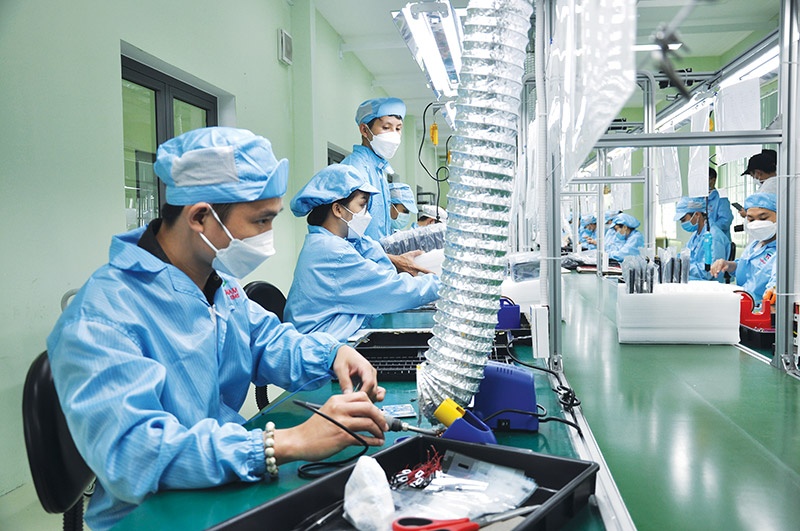Danang high-tech parks achieving wider attention
 |
| Incentives are being offered to allure new businesses into Danang Hi-Tech Park |
On June 17, Danang Hi-Tech Park and Industrial Zones Management Authority (DHPIZA) approved the planning for the $60 million Micro-Electro-Mechanical Systems (MEMS) factory, to be funded by Vector Fabrication Inc. from the United States. Covering an area of 40,000 square metres, the factory will produce printed circuit boards while simultaneously studying and producing MEMS. Construction is expected to start this year and the factory’s first phase will come into operation in early 2025.
DHPIZA director Pham Truong Son said that since borders reopened in March, many foreign-invested enterprises (FIEs) have begun to look for investment opportunities in the city’s hi-tech park and industrial zones (IZs). “Thanks to outstanding advantages, our IZs are considered a trusting destination by investors. Since early this year, Danang has granted investment registration certificates for 10 projects worth over $53 million, two of which are foreign-funded and which take up $5.04 million of the total,” Son said.
To date, the city has attracted over 378 domestic ventures worth $1.22 billion and 129 foreign-invested projects worth $1.8 billion. The DHPIZA in particular has lured in 22 projects – 12 domestic ones worth over $273 million and 10 foreign-led schemes worth $400 million.
Major investors from such countries as Germany, the Netherlands, and Japan are creating the most activity and interest in Danang.
A delegation of German auto supplier Brose Group paid a visit to Danang Hi-Tech Park to seek investment opportunities in the central coast city. Brose, founded in 1908, is the fourth-largest family-owned automotive supplier in the world and has distinguished itself in its long history through innovative products and manufacturing technologies.
Many FIEs have opened high-tech factories in Vietnam, such as a $110 million semiconductor manufacturing factory known as United States Enterprises. The factory is registered under two American investors who currently own Hayward Quartz Technology, a leading supplier for original equipment manufacturers. Another project involves a $35 million research and development centre funded by Japan’s Fujikin International Co., Ltd.
In 2002, the DHPIZA granted an investment proposal for Arevo Inc. to implement a project to manufacture 3D printers and related software, as well as design 3D-printed carbon fibre composite materials.
Son noted that there are numerous incentives for businesses investing in Danang Hi-Tech Park, which is currently in phase 3 of implementation. For instance, investors landing new projects, or those building social housing blocs for sale and lease to park-based workers, will be entitled to corporate income tax (CIT) exemptions and reductions over several years. New ventures valued at $130 million or more are entitled to a CIT rate of 10 per cent for 30 years.
Investors with projects in the park are also given land rent exemption during the construction phase, but not exceeding three years from gaining their land lease decision. They also enjoy other incentives associated with site clearance, preferential import duty, and entry/exit procedures, among others.
To meet growing development requirements, Danang has revised the roadmap for implementing the park towards 2030. Currently the project, which was established in 2010, is classified as Grade A with a total planning area approximating 1,128 hectares.
Danang is seeking prime ministerial approval to revise the park’s master planning to increase scale by an additional 715ha, and attract leading tech groups and large-scale projects with investment ratio from $15 million per hectare and beyond.
According to Danang Party Committee Secretary Nguyen Van Quang, high-tech industries are one of three key development pillars in Danang that will receive priority resources for development.
The city will then gear efforts towards increasingly perfecting infrastructure and relevant incentive policies for investment promotion, helping the park charm investors and from there turning high-tech industries into a breakthrough for growth.
Vietnam currently has three multi-functional high-tech parks, with the other two being Hoa Lac and Saigon Hi-Tech Park.
What the stars mean:
★ Poor ★ ★ Promising ★★★ Good ★★★★ Very good ★★★★★ Exceptional
 Tag:
Tag:
Related Contents
Latest News
More News
- Kurz Vietnam expands Gia Lai factory (February 27, 2026 | 16:37)
- SK Innovation-led consortium wins $2.3 billion LNG project in Nghe An (February 25, 2026 | 07:56)
- THACO opens $70 million manufacturing complex in Danang (February 25, 2026 | 07:54)
- Phu Quoc International Airport expansion approved to meet rising demand (February 24, 2026 | 10:00)
- Bac Giang International Logistics Centre faces land clearance barrier (February 24, 2026 | 08:00)
- Bright prospects abound in European investment (February 19, 2026 | 20:27)
- Internal strengths attest to commitment to progress (February 19, 2026 | 20:13)
- Vietnam, New Zealand seek level-up in ties (February 19, 2026 | 18:06)
- Untapped potential in relations with Indonesia (February 19, 2026 | 17:56)
- German strengths match Vietnamese aspirations (February 19, 2026 | 17:40)






















 Mobile Version
Mobile Version